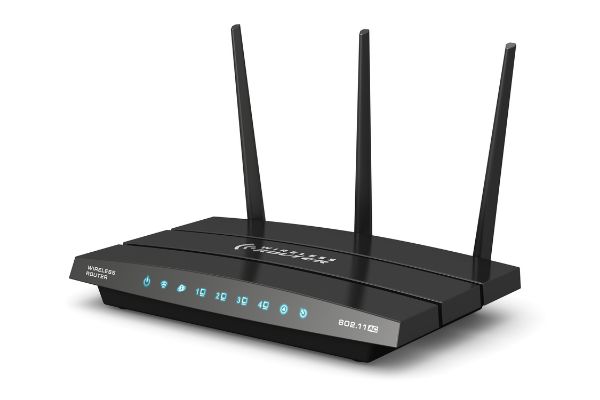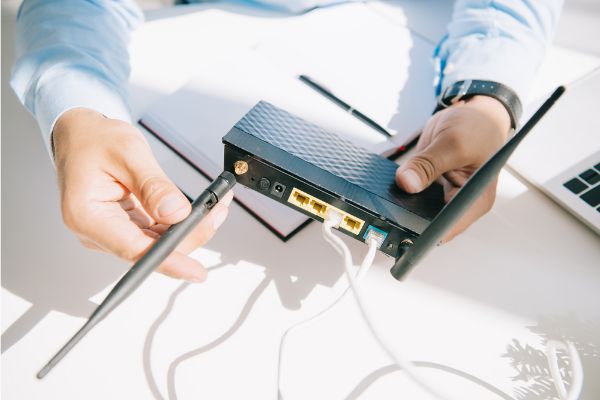Disclaimer: This post may contain affiliate links, meaning we get a small commission if you make a purchase through our links, at no cost to you. For more information, please visit our Disclaimer Page.
The image of a router you might get is just a simple box that sits near your modem. You can think of the router as the primary distributor for your internet service provider’s signal.
When you sign up for service, they send one signal to your home or business based on your account, and the router is responsible for delivering that signal to all connected devices within the range of the given network. Occasionally, extenders may be necessary to increase that range and efficiency, but most home routers will get the job done on their own.
Having said that, some people wonder if routers are a classic case of getting what one pays for. Strong, stable Wi-Fi coverage is necessary for home entertainment, but it can be vital for work operations that need to go smoothly. We will talk about some of the possible differences between expensive and inexpensive routers below.
Further, we’ll discuss whether budget routers are perfectly serviceable in most respects, and we will touch on how they might stack up against expensive routers in terms of which one is worth it. For troubleshooting, we’ll cover some of the common reasons why routers might fail, too.
Table of Contents
Do More Expensive Routers Make a Difference?
Router prices can vary widely, but many of the models you’ll see from different brands offer features that are similar to one another. With that said, more expensive routers may offer some secondary features that might be useful to you in some situations.
However, this isn’t true in all cases, and it can depend greatly on the kind of work you want the router to do. Yes, more expensive routers can make a difference, but many regular users of home internet may not notice any of these changes or perks.
Where a more expensive router might shine is in some things that have yet to be rolled out on a wide scale. For example, newer routers will be able to handle 6E Wi-Fi that runs on 6 Ghz bands, but that is only worth it once that becomes a standard.
There are some current and advanced features that you might be able to take advantage of with a router that you consider expensive. However, again, These are settings that you won’t enable or set up unless you really know what you’re doing and need to make precise changes to how your Wi-Fi functions.
What each person defines as expensive is relative, but it could be worth it to go for a pricier router if you’re still using a very old one. In this case, the new router might seem expensive when measured against your current one.
Most manufacturers expect their routers to perform well for five years or so, but many of them can end up lasting considerably longer than that.
If you are using a router that is several years old, it may no longer get firmware updates that can help it with security and functionality. In such a case, your router could be at risk from outside sources.
Additionally, it may lose some of its ability to bring your ISP’s signal to your devices. If you are still using the same tier of internet service as when you purchased the router, you may not notice a dip here, but it is possible.
Are Cheap Routers OK?
As always, it is best to use a router that is from a reputable brand, and that means that you can buy a relatively inexpensive model, but you shouldn’t go for something that is too cheap.
A lot of your choices here might depend on how your ISP is set up, and what options they give you for service. If you have an internet speed package that is relatively slow but serviceable for your needs, a cheap router should do what you need it to do.
As we mentioned, you may not need a lot of features or extras when it comes to your home internet. Even most office-based internet can use the bare minimum that is necessary to make sure networked computers and other devices have the Wi-Fi connectivity that they need in order to function.
The other way a router’s price or features might be reliant on your ISP is in how they offer services to you. Some service providers recommend that you rent modems from them in order to ensure that you get the best signal with the fewest problems or errors.
Sometimes, you can also purchase routers from the company in order to spread that signal out. While you are free to buy a more expensive router of your own, it is possible that things could get complicated when you run into a problem with it.
It isn’t uncommon for routers to have some errors that might prevent them from accessing your Wi-Fi network. When this happens, none of your connected devices will have access to the internet, although you should still be able to use a smartphone with its own data plan. You can also plug a laptop computer directly into the modem as a way to get your internet back and assess the situation.
However, your first task should be to restart the router and modem to see if that fixes the issue. If it does not, there are a few other things you can try, but calling your provider may be a good second step. This way, you can avoid unnecessary work or backtracking.
If you do get in touch with your service provider, much of what they can help you troubleshoot might be based on the specific brand or models of routers that they offer to customers. While some of these fixes should be applicable to almost any router, the tech on the other end will have the most familiarity with their own company’s hardware.
This can make it much easier for professionals to help you diagnose and fix what is wrong with your own router. While it may not be essential, it is a bonus that comes with routers from ISPs that may be cheaper than some of the ones you would like to use.
So, Are Expensive Routers Worth It?
Expensive, high-end routers can be worth it. If you want to take advantage of some niche features, and you know how to use those features to your benefit, you may want to get a more expensive router.
However, relatively inexpensive routers are fine for most consumers. Some of the things a more expensive router might offer you are specialized, and they will need to be set up in a certain way.
Consumer-grade routers will have guides and help tools that will allow you to get a new router up and running in no time at all. Enabling the enhanced features of a more expensive piece of tech could take some time.
There is no one correct answer to this question, and it is highly dependent on both the end user and their needs or wants. Most of the cheaper routers that you will find can handle the top speeds your ISP can offer.
They will have some firmware updates as the years go by, and they are designed to handle higher speeds even if your ISP chooses to introduce new tiers. These routers can provide stable connections for streaming video calls, gaming, and more from multiple devices in a home, usually without any noticeable problems.
One of the few other reasons an average consumer may wish to go with a more expensive router is if they wanted to future-proof some of their internet technology. In this case, you would make educated guesses as to the future of the internet and the companies that provide it.
Buying an expensive router with lots of features could mean that you are already prepared to take on any major changes to the network when new things are rolled out. For your average user, however, this is probably unnecessary.
Do Wi-Fi Routers Degrade Over Time? 7 Reasons Why
Technology changes, but it can also decrease in its effectiveness over time. Routers have a lot of hardware doing work almost all day and night, so they are no exception to this rule. There are several ways in which a router could lose some of its effectiveness over time. However, it is also important to remember that only some of a router’s parts could wear out on a routine basis.
The actual reasons for routers seeming to degrade after a few years are usually because of changes with how we handle internet access and traffic in general more than problems with routers getting old. That said, some drops in performance can happen. Here are just a few of the ways you might see this:
1. Routers handling constant traffic are on and working all the time. This can generate heat that is nearly constant. While this should not be enough to have an impact on the components in a big way, it can cause problems if the router stays in an area with little ventilation for too long.
2. Because routers carry a lot of data and power through their components, these things can wear out over time. In particular, transmitters and capacitors could lose some of their functionality.
3. An older router might not be designed to handle an environment surrounded by many other routers. As more access points open up nearby, it can look like your router is degrading. Newer routers have more advanced hardware that is designed to handle such situations.
4. Although it is rare, there could be issues with flash memory. Flash memory holds your router’s settings. It’s also what is in use every time you give the router a necessary firmware update.
It isn’t common for this to fail outright, but it could degrade the more it writes or has data overwritten on it. If your router seems not to be able to hold the settings you’ve put in place, it could be an issue with flash memory degradation.
5. Dust, debris, and other things might clog the internal components of the router. This can lead to less efficient operations, a seeming drop in internet speed or stability, and the sense that the router is degrading.
6. If your home network is not shielded properly against outside cyber threats, your router could be vulnerable to attacks that mess with its firmware or cause it to slow down the internet speeds it can give you. In some cases, such things may have a great enough impact on the router that you’ll need a new one.
7. It may not degrade the unit itself, but adding way too many devices to one router at a time can cause some significant issues with overall connectivity and internet stability in the home.
Most consumer routers can handle many devices at once, including all of those for families and visiting friends. However, be mindful of trying to get a single router to manage signals for too many devices at one time.
Conclusion
Routers can vary in size and capabilities as much as they do in price points. However, at their cores, most routers made with the average consumer in mind are going to do the same basic things. They should be perfectly adequate for homes, and some inexpensive routers can work in larger office spaces, too.
Whether high-end routers with big price tags are worth it is up to the individual or company in question, but they can offer some advanced features that may enhance how you’re able to make use of your Wi-Fi network. In most cases, though, you should do just fine with any reputable brand that is friendly on your wallet.


